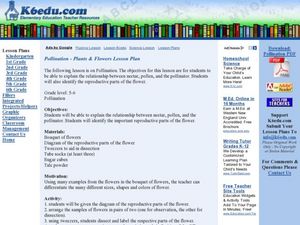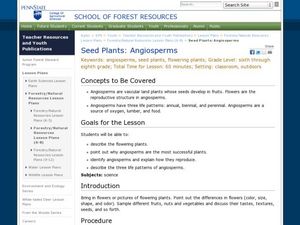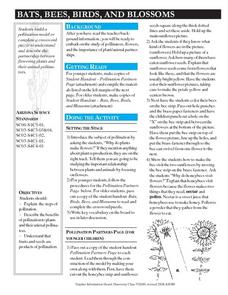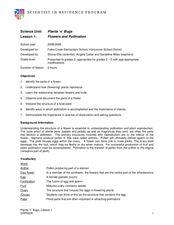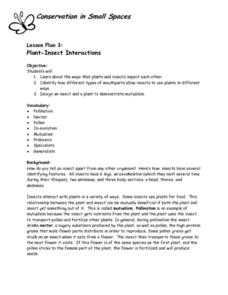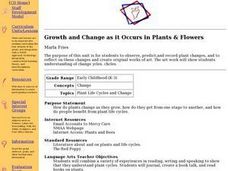Curated OER
Pollination
Students investigate pollination. In this plant biology lesson, students study a diagram of the reproductive parts of the flower and dissect and identify the parts of a real flower.
Curated OER
Pollination-Plants and Flowers Lesson Plan
Learners study the reproductive parts and pollination for a flower. In this pollination lesson plan, students dissect flowers to perform an investigation. Learners also use tube socks to show how pollination works. A diagram is included.
Curated OER
Pollinator Habitats
Students read and discuss background information included with this lesson. They brainstorm the best sources for developing a list of native or migratory pollinators. Students work in groups to design habitats based on information...
Curated OER
Seed Plants: Angiosperms
Students describe flowering plants and see why angiosperms are the most successful plants. In this angiosperms lesson students identify angiosperms and explain how they reproduce.
Curated OER
Pollination
Fourth graders explore the pollination process. In this plant biology lesson plan, 4th graders dissect a flower to identify the parts of a flower and watch a video to see seed dispersal. Students write about the pollination process.
Curated OER
Co-evolution of Plants and Pollinators
Students, while studying the rolls of pollinators and plants, explore co-evolution of mutualistic relationships.
Curated OER
How Do Plant Life Cycles Vary?
In this plant life cycle worksheet, students will complete this graphic organizer by writing in the 3 steps in a plant life cycle.
Curated OER
The Great Pollinators
Students discover the reproductive parts of a plant. In this biology lesson, students identify and categorize several different plants they dissect in class. Students record their information using a data chart.
Curated OER
Bats, Bees, Birds, and Blossoms
Youngsters use a paper bee to pollinate two paper flowers. They use hole-punch dots as pollen. Older learners dissect flowers and name the structures involved in pollination. The handouts mentioned in the lesson plan are not included, so...
Curated OER
Inviting Butterflies to the Schoolyard
Students create a butterfly garden. In this butterfly garden lesson, students plot a garden with plant species that will attract butterflies. Students learn about the specific plants and items that will help butterflies use the garden.
Scholastic
Study Jams! Flowers
RJ hangs out in Zoe's garden as she explains pollination, flower anatomy, and fertilization. This cartoon-styled feature is sure to stay in your botanists' minds! Follow it with the dissection of large flowers, such as the lily.
Museum of Science
Egg Carton Nursery
Observe nature in action. Young biologists make plant nurseries from cardboard egg cartons. Once the seeds sprout, they move the flowering plants outside and make observations of bees that pollinate the flowers.
Curated OER
Pollination Parties!
Students conduct research on a specified plant and how it is pollinated. In this pollination instructional activity, students discover how bees pollinate plants and make life better for humans. After completing research,...
Curated OER
What Are Plant Life Cycles?
In this plant life cycles worksheet, students will write in the main idea of the life cycle of a flowering plant. Then students will write in 3 supporting details.
Curated OER
Flowers and Pollination
Young scholars explore the environment by researching plant reproduction. In this pollination lesson, students define botany related vocabulary terms such as disc flower, petal and fertilization. Young scholars dissect a flower with...
Curated OER
Life cycles
Students identify and explain the parts of a flower and their role in the life cycle of flowering plants, including pollination, seed dispersal and germination using the Internet. Students will also study and discuss the key points and...
Curated OER
Plants 1: Plant Parents
Students review their prior knowledge on plants. In groups, they compare and contrast the difference between reproducing asexually and sexually. Using the internet, they research how some plants can be forced to produce asexually.
Curated OER
Flowers and Their Life Cycles
First-time florists will be able to label the structures of simple and composite flowers after reading this handout and answering the comprehension questions. There are a couple of grammatical errors in the text, but the content is...
Curated OER
Buzzy, Buzzy Bee
Students simulate honeybees pollinating flowers. In this pollination lesson, students role-play the process of pollination over the course of several seasons. Students graph results and share their graphs with the class.
Curated OER
Life Cycles
Students explore the parts of a flower and pollination of flowers. In this plants lesson, students use an interactive whiteboard to label the parts of a plant and the functions of each part. Students complete a worksheet as an assessment.
Curated OER
Just Bee-Tween Flowers!
Pupils examine the major plant and bee parts and the interdependency between bees and fast plants. They observe and record the stages of growth of fast plants, take photos of the plant's life cycle, and cross-pollinate plants.
Curated OER
Conservation in Small Spaces: Plant-Insect Interactions
Students explore ways that plants and insects impact each other, identify how different types of mouthparts allow insects to use plants in different ways, and design an insect and a plant to demonstrate mutualism.
Curated OER
Prairie Math
Students work together to build models of prairie plants. Using the model, they estimate the height and then measure them using metric and standard units. They write a fraction to represent their part of the whole set and compare and...
Curated OER
Growth and Change as it Occurs in Plants and Flowers
Students work together to observe plants and flowers through their life cycle. In groups, they make predictions and record changes in a journal. Using this information, they create their own original artwork and discuss the plants life...



